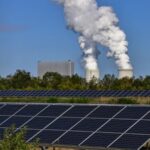Energy News Beat
A government compromise in Berlin envisions radical changes to the country’s renewables subsidy approach and details a fleet of backup power plants to underpin the country’s coal exit.
Designed in the late 1990s, Germany’s renewable energy law guarantees wind turbine and solar panel owners a 20-year high price for electricity fed into the grid. The country quickly became famous for its pioneering Energiewende.
This paradigm is on the brink of change, the government announced on Friday (5 July), against the backdrop of fiscal strain and an identified need for backup power generation.
“Our goal is an electricity market that ensures a secure, affordable and greenhouse gas-neutral supply of electricity with at least 80% from renewables,” reads the coalition government’s internal agreement.
To that end, two fundamental principles of the renewables subsidy scheme will be changed as of 2025.
Firstly, there is no remuneration for power produced during times of negative prices when there is already excess power being supplied to the grid. The move pulls forward an EU requirement by two years.
Secondly, there is a paradigm shift in how renewables are supported by the state.
“The expansion of new renewable energies is to be switched to investment cost subsidies,” the agreement reads, adding that this should be done “to allow price signals to have a distortion-free effect.”
Currently, government support is linked to electricity production, ensuring that renewable developers can ensure a minimum revenue level for every unit of power produced.
From guaranteed earnings to a lump sum investment subsidy is a leap – “The experiment of a radical change to investment cost subsidies contains the risk of market uncertainty,” said renewables lobby group BEE on Friday.
For the liberal FDP (Renew), the smallest government party, making the change was long coming.
“I am delighted that we are starting to phase out the renewables subsidy scheme [EEG],” said MP Michael Kruse, the FDP’s energy spokesman, in an accompanying press release.
The free-market party’s opposition to the scheme is in part due to its high cost—subsidising renewables will cost “€17 billion, that is the current calculation for next year,” said FDP Finance Minister Christian Lindner at a press conference in Berlin on Friday.
Not all are happy with this agreement to phase out the traditional mechanism, even within the government.
“From today’s perspective, it is neither feasible nor, strictly speaking, intended to subsidise investment costs, rather only as a test model or laboratory,” said MP Nina Scheer, the left-of-centre SPD party’s energy spokeswoman, in emailed comments to Euractiv. The SPD are a member of the government coalition.
“In my opinion, the model contains obvious investment risks. These must be avoided at all costs,” she added.
The transition would need to happen in the coming years to have a meaningful effect, given that the government similarly vowed to stop supporting renewables once coal is no longer being burned for power – 2038 at the latest.
A second major milestone in the German energy transition will be the construction of new gas power plants – some of which can run on hydrogen.
“The construction of new power plants will secure the coal phase-out,” explained Robert Habeck, minister of economy and climate action, on Friday. The coal exit for 2030, which is “ideally” envisioned by the government, is largely considered to be unattainable.
Within the year, Berlin hopes to tender five gigawatts (GW) of new gas power plants for immediate construction, abandoning plans for a fully hydrogen-ready fleet. This would be followed by another five GW of plants that must run on hydrogen, but only from the eighth year of their operation. Two GW of old gas plants should be retrofitted.
Half a GW of dedicated first-day hydrogen power plants will also be built, alongside another half GW of long-term energy storage facilities.
The plants will be put into a “comprehensive, technology-neutral capacity mechanism, which will be operational from 2028.”
Andreas Jahn, senior advisor at clean-energy think tank RAP, explains that the plan “represents an important compromise that secures the transformation of the German electricity system.”
All of this will require market subsidies that have been “in principle” greenlit by Brussels.
“Following intensive discussions between the Commission services and the German authorities,” the two agreed on “a way forward,” a Commission spokesperson told Euractiv.
“Germany plans to launch the first competitive bidding process at the end of 2024/in early 2025,” they added.
[Edited by Donagh Cagney/Alice Taylor]
Read more with Euractiv
Take the Survey at https://survey.energynewsbeat.com/
Crude Oil, LNG, Jet Fuel price quote
ENB Top News
ENB
Energy Dashboard
ENB Podcast
ENB Substack
The post Germany embarks on ‘radical change’ to finance renewables appeared first on Energy News Beat.








